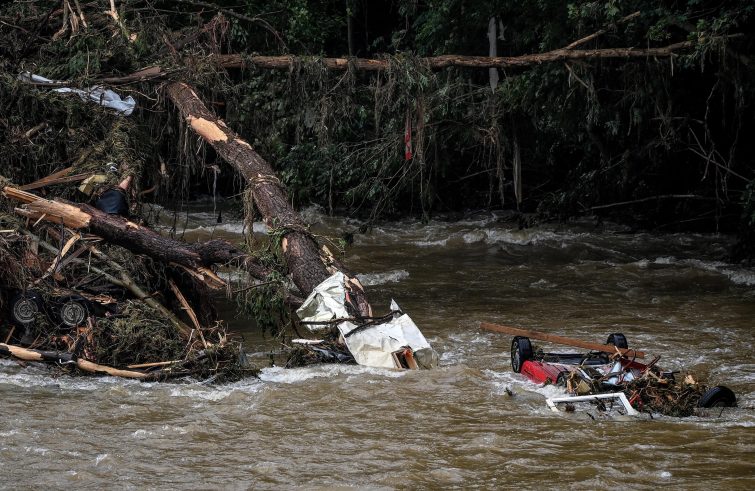
Almost two hundred people have been killed as severe floods swept through Northern Europe. Unseasonal heavy rains are also caused by climate change, land degradation and damage to ecosystems. Last week, The European Commission adopted a package of proposals to make the EU’s climate, energy, land use, transport and taxation policies fit for reducing net greenhouse gas emissions by at least 55% by 2030, compared to 1990 levels. The goal is to make Europe the world’s first climate-neutral continent by 2050, making the European Green Deal a reality. The EU Commission has also adopted a new Forest Strategy for 2030. SIR broached the issue with Giuseppe Milano, Greenaccord Secretary General .
 Are the floods that hit Northern Europe a wake-up call on the consequences of climate change? Are they linked to heat islands caused by land degradation?
Are the floods that hit Northern Europe a wake-up call on the consequences of climate change? Are they linked to heat islands caused by land degradation?
Collective imagination has seen Germany as a world superpower for years, owing to the complexity and diverse nature of its economic policies. The latest floods, of unexpected severity, caused by accelerating climate change, convey the only image we have consistently turned a blind eye to over the past decade:
As the European Environment Agency confirms, Germany is the country with the highest rate of soil sealing in Europe, ahead of Luxembourg and Italy.
Urban development has occurred where it shouldn’t have, such as on river beds and vulnerable territory.
Liberal economy inconsistencies have overshadowed the case for integral ecology.
The recent ruling of the Federal Constitutional Court rejecting the Climate Bill, just a few days after the most severe environmental disaster in German history, confirms the failure of Chancellor Angela Merkel’s Green policies.
Are the targets set by the European Commission’s latest Green New Deal package feasible?
We have the technology and the resources: no policy is unfeasible today.
However, if fossil fuel lobbies’ financial power continues to hold sway over the democratic power of national governments, without understanding that we cannot wait until 2030 to meet the sustainable development goals, the Green New Deal will remain a “vademecum of hopes betrayed.”
Cutting emissions by 55% – now cut by only 19.6% – requires stepping up by almost twice as much the poor efforts made in the past nine years. Despite the rhetoric, resilient policies are scarce not only in Germany and Italy, but also in France and Spain, not to mention Eastern European countries such as Poland, Hungary and Russia.
Perplexities on this package of measures have already surfaced: some are concerned about the backlash on industry and social impact. What are the key measures envisaged by the Commission and how can different needs be reconciled?
The “Fit for 55″ package, with its 13 legislative proposals, is designed to serve as an ethical-ecological scalpel operating on the wits of Old Europe to avoid younger generations from blamelessly paying an incalculable “ecological debt.”
In particular, in the awareness that no effective and radical change is painless, the package proposes a revision of the EU emission trading scheme (EU ETS); a carbon border adjustment mechanism (to avoid delocalisation); updating renewable energy and energy efficiency directives; regulating the air and maritime transport system; and establishing a Social Fund for socially sustainable transition. Companies will be financially supported in order to expedite green transformation and phase out fossil fuels. But now is the time for them to act with greater sensitivity and co-responsibility towards the young.
Profits aren’t everything.
For environmental organisations the measures are insufficient and it’s too late to reach the 2050 target. Is there still time?
The UN IPCC provides a direct answer to this question:
there is no more time to waste because we are nearing a point of no return.
The increasingly frequent extreme weather events – such as recent heatwaves and wildfires in Canada – remind us that urgent and effective action is called for today. Environmentalists are therefore rightly calling for a 65% reduction in greenhouse gases by 2030 and total electrification of transport by 2035.
Proposals have been made to encourage renewables but, as stated in the recent ISPRA/SNPA report on land use in Italy, photovoltaics could have harmful effects if land is being used to the detriment of agriculture. What are your thoughts on this?
Renewable energies are vital for the planet and fundamental for our country which, thanks to its geographic features, could become a top European player. However, at least 15 of the 65 GW needed, if generated by mega renewable energy parks installed on natural terrains, would require at least 12,000 hectares of land, whereas a genuine transformation would be to not only protect a non-renewable resource such as soil, but also to utilise all the rooftops of our country’s residential, commercial or industrial buildings, whether in use or abandoned.
In this respect, Italy’s NRP is superficial and nothing is said about what will happen in 25-30 years’ time when the infrastructure will be removed at the end of its lifecycle.
To what extent is the preservation of forests and the planting of new trees crucial to safeguarding biodiversity and mitigating climate change?
Trees and, in general, forests or nature-based solutions such as ecological corridors and flood plains restoration are key.
Although cities account for just 3% of the earth’s surface, they produce over 65% of total polluting emissions, and although population growth is predicted to increase globally by the end of the century, we need to drastically cut our energy consumption and radically embrace the strategic and holistic vision of integral ecology recommended by Pope Francis. In a joint Report, UN IPCC and IPBES have recently confirmed the interconnection between biodiversity loss and accelerating climate change, urging national governments to take action to restore degraded ecosystems, protect limited natural resources such as soil and water, and cut subsidies to environmentally harmful polluters that undermine the balance of the biosphere.











